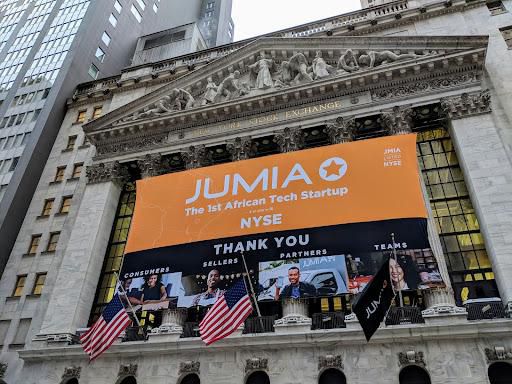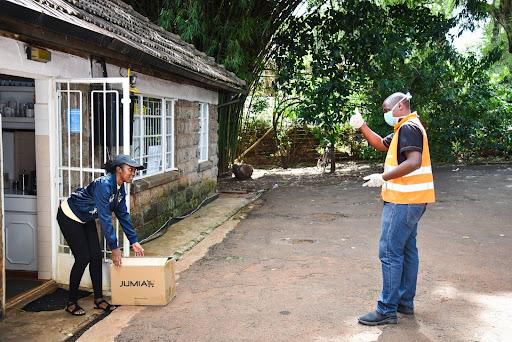#10YearsWithJumia: Milestones moments when one startup revolutionised ecommerce in Nigeria and beyond
)
With its tripartite business model: Jumia Marketplace, Jumia Pay and Jumia Logistics, the company is now the largest e-commerce platform in Africa. It currently has a presence in 11 countries across the continent and a workforce of over 4000 direct employees while creating more than 400,000 jobs through ecosystem partners.
As Jumia marks a decade in the business, here’s a look into remarkable moments from the company’s founding in 2012 to date.
Little Beginnings - 2012
Founded by two former McKinsey employees, Sacha and Jeremy, in Lagos when the e-commerce system in the country was next to nothing and the infrastructure for last-mile logistics was barely existent. Jumia’s launch of an online retail platform was a game-changer for sellers and buyers in Nigeria. Loosely quoting the Jumia’s chairwoman Juliet Anammah: retail before the days of Jumia, mostly happened in two ways: a high-end store located in one of Nigeria’s big cities, and if you couldn’t afford that, the alternative was the open-air markets.

Expansion Across Africa & Launch of Doorstep Food Delivery - 2013
Within a year of its launch, Jumia had expanded into major African markets including, Egypt, South Africa, Morocco, Kenya and Côte d'Ivoire. The platform also began offering food delivery services, first in Nigeria and then in other select markets. For the first time in countries like Nigeria and Kenya, consumers could explore their favourite meals from local restaurants all from the convenience of their mobile device and have them delivered to their door.

A million Customers & Black Friday is introduced - 2014
Jumia launched its Black Friday commercial event in 2014, marking the first time that the global shopping event would be observed in Nigeria. The Black Friday culture has continued to grow and thrive in the country. It is now one of the most anticipated holiday experiences in the country, with many retail outlets and consumers participating every year. By 2015, the platform reported a million customers across Africa on the Jumia marketplace, and in 2017, more than 100 million consumers visited the Jumia marketplace during the Black Friday season.
Jumia Introduces its Easy and Secure Online Payment - 2017
Diversifying from logistics and retail, Jumia introduced its proprietary digital payment solution, JumiaPay in 2017 to make online transactions faster, easier, and more secure for its customers. The product was first launched as a payment gateway on the Jumia Marketplace but now facilitates online payments and the distribution of a broad range of digital and financial services.

Jumia Becomes First African tech startup on the New York Stock Exchange - 2019
Valued at $1 billion in 2016, Jumia became Africa’s first unicorn and, in 2019, became the first tech startup from the region to be listed on the NYSE. After the listing, the company raised $196 million in net proceeds and attracted investors like MasterCard.

Jumia Offers Fulfillment Logistics Services to Businesses - 2020
In 2020, Jumia opened its logistics infrastructure to third-party businesses, offering them the opportunity to expand their customer reach through its nationwide fulfillment services. Jumia’s extensive supply chain network has become a game-changer for consumer goods distribution, with SMEs like Zaron cosmetics and Bature Brewery leveraging its platform to expand.

Jumia Introduces Free Delivery & Releases First ESG Report - 2022
Early this year, Jumia introduced free delivery in Lagos, Abuja, and Ibadan, encouraging customers to conveniently shop online without the worry of delivery fees. Later in May, the company also shared its first Environmental Social Governance report, providing an overview of current sustainability practices at Jumia, which included minimising unnecessary transit involved in logistics and delivery, while improving the energy efficiency of operations. Jumia is also committed to supporting job creation, entrepreneurship, and the growth of MSMEs by providing business loans and credit services to Jumia Marketplace sellers.
A Decade of Impact: #10YearsWithJumia
As Jumia marks a decade of relentlessly pursuing its mission to positively transform everyday life in Africa using technology, the company has become much more than a retail website but a leading brand facilitating the digital shift in Africa.
Celebrate #10YearsWithJumia by joining the conversation online today!
_----_
#FeatureByJumia
)
)
)
)
)
)
)
)
)
)
)
)
)
)